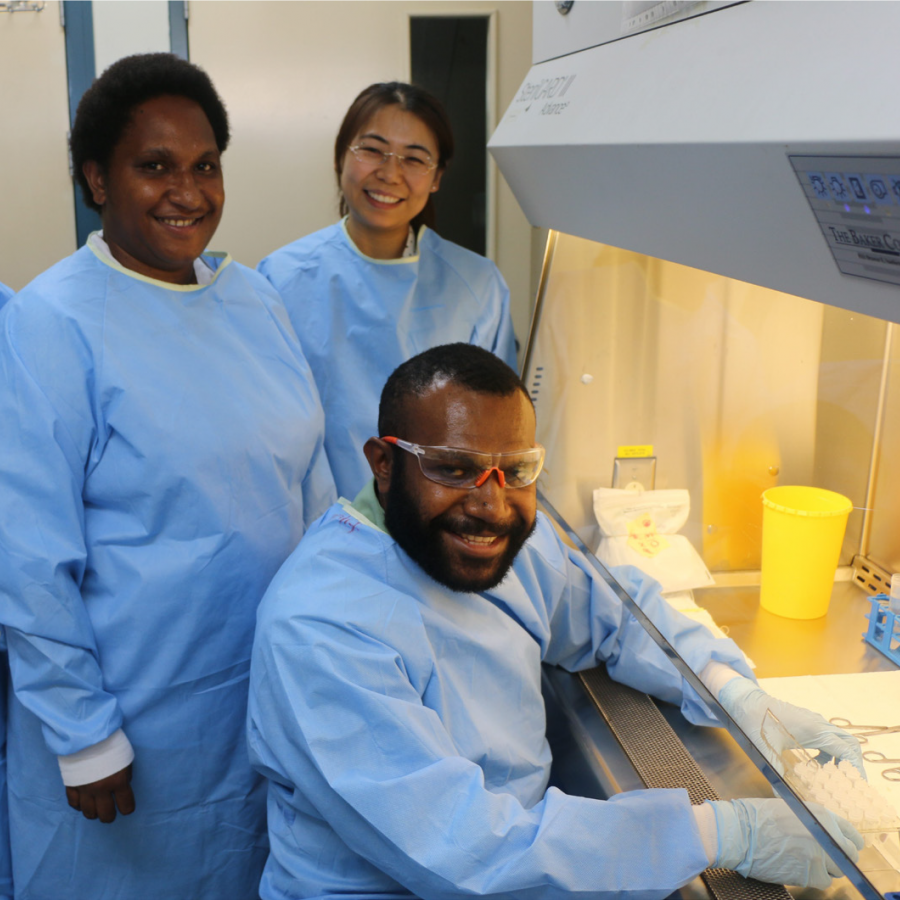Health
Overview
Australian aid provides scholarships for students from partner countries to study health-related courses at Australian universities. These scholarships help to build the skills of individuals in health policy and services and enable them to contribute to their home communities.
Profile: Tamarah Koleala
Ms Tamarah Koleala, Senior Scientific Officer with the PNG Institute of Medical Research (PNGIMR), received an Australia Awards scholarship to undertake a Master of Biotechnology (Clinical Microbiology) at Melbourne's RMIT University in 2015-2016.
After completing her degree and returning home to her work at PNGIMR, Tamarah has been involved in the Trilateral Malaria Project (TMP), a cooperation between Australia, China and Papua New Guinea, working towards the elimination of malaria in PNG.
This work is particularly relevant to PNG, as it accounts for over three-quarters of all malaria cases in the Western Pacific region. PNG has made significant progress in reducing the burden of malaria: in 2009, one in five people got sick from malaria, but by 2014 this number had dropped to one in twenty and deaths attributed to malaria declined by 70% (though the situation remains much improved, in the last couple of years the trend has changed with the number of cases increasing). Despite progress, significant challenges remain: nearly 40% of all patients who attend a health facility with symptoms of malaria are not diagnosed through either a rapid diagnostic test or microscopy and for some patients who are found to have malaria, drugs are not always available for their treatment.
Tamarah's work is at the forefront of research to help. She is responsible for the molecular assays for samples collected, which provide information on changes within malaria parasite populations. The studies serve as powerful tools that guide malaria control and elimination strategies within the country. As Tamarah notes, 'Malaria case management is crucial in our drive to eliminate malaria in PNG. Some of the key challenges of diagnosis in malaria case management are the feasibility, reliability and efficiency of point-of-care tests that are available and currently in use in the country.'
Two areas of diagnosis and testing that Tamarah is closely involved in are higher sensitivity testing of routine malaria rapid diagnostic tests, and the piloting of point-of-care tests for some particular malarial parasites in clinical settings in PNG.
Tamarah explains the benefits: 'Operational research generates evidence of practical use to inform policy decisions on malaria diagnosis and treatment. It also addresses key challenges related to case management particularly the diagnostic aspect providing much needed evidence for the National Malaria Control Programs.'
Tamarah is also working on another project carrying out the field evaluation of a novel device that can be used to detect malaria for surveillance purposes: the Rotating Magneto Optical Device uses a laser and a rotating magnet to detect malaria parasites.
Tamarah's Master's program at RMIT included 'work integrated learning' and she says that being in Melbourne offered many prestigious options. In the end, she spent a year at the Population Health and Immunity Division of the Walter & Eliza Hall Institute of Medical Research (WEHI). Her work looked at a human red blood cell polymorphism that is prevalent in West Africa, with a research project undertaken in collaboration with the Malaria Research & Training Centre at the University of Bamako in Mali, West Africa.
Tamarah says she learnt a great deal about laboratory standards and practices working in the WEHI facility, including techniques that she now uses in the TMP: 'Just working at WEHI exposed me to strict biosafety and chemical safety guidelines and practices that is helping me a lot in my contributions to this area in my institute. We are looking into improving policies and practices and hopefully extend towards developing policies for our country in this area.'
But she also says the experience 'extended beyond the boundaries of the laboratory. The best part of my time at WEHI were the seminars and presentations.' Presentations from various divisions within WEHI studying a variety of diseases offered a way of learning from a huge range of experts.
In the spirit of Australia Awards – where scholars consolidate their knowledge through study then return home to employ it and share – Tamarah is sharing her expertise: 'The Trilateral Malaria Project has also given me the opportunity to share my molecular diagnostics skills and knowledge with another Papua New Guinean institution. The Central Public Health Laboratory (CPHL) is in the process of establishing molecular diagnostics for malaria for the first time. I spent two weeks last year with their staff to set up their malaria Polymerase Chain Reaction laboratory so that CPHL can do this work in-house, instead of sending samples away for analysis.'
A great example of building in-country capacity in Australia's regional partners.
To sum up her Australia Awards experience, Tamarah explains it offered her the expertise she needed to return home and support local institutions and the health sector: 'Building a career in medical research is difficult in a resource-limited country like ours. The knowledge and skills gained from my Australia Awards studies has helped me a lot in my work on the TMP project. I am very grateful to the Australian Awards Scholarship program, whose academic, personal and long term benefits to a developing scientist like myself is priceless.'
How to apply
More information, including applicant eligibility criteria can be found at:

